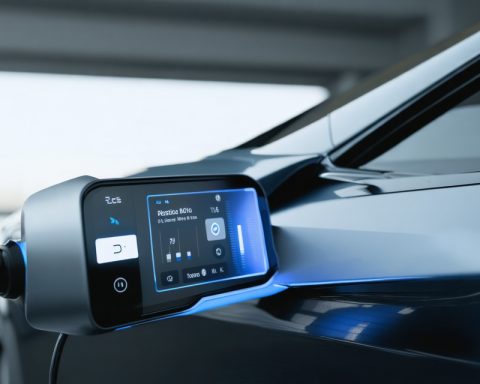- BMW focuses on refining lithium-ion technology instead of pursuing solid-state batteries, emphasizing affordability and performance.
- The new lithium-ion packs will feature in BMW’s upcoming Neue Klasse line, promising significant improvements in charging speed and efficiency.
- BMW’s advancements include an 800-volt architecture, anticipated to boost range and charging efficiency by 30% across its sporty models.
- Solid-state batteries face practical challenges such as high costs, which BMW views skeptically compared to incremental improvements in existing technology.
- The company’s strategy highlights the importance of perfecting current technologies to meet consumer needs while maintaining competitive innovation.
The landscape of electric vehicles hums with the promise of futuristic technology, yet BMW’s strategic maneuvers suggest an alternative path to innovation. While competitors dart towards the elusive solid-state battery, BMW places its chips on the relentless refining of lithium-ion technology.
Under Munich’s bustling skyline, the Bavarian automaker embarks on a daring quest. Amid futuristic hopes, BMW foresees a world where cutting-edge lithium-ion advancements shape the future of transport. With an elegant blend of engineering and pragmatism, the company hones in on affordability and performance, championing consumer needs. Thinner, more efficient lithium-ion packs will soon power the long-awaited Neue Klasse line, boasting charging speeds quick enough to silence the taps of impatience. Imagine adding 186 miles with just ten minutes of plugging in—a tantalizing prospect for the modern driver.
Insiders dissect the allure of solid-state batteries with skepticism, pointing to prohibitive costs that cloud their practicality. For BMW, evolution emerges not from the leap to new realms but from revolutionary gradual advances. Sporting an 800-volt architecture, the new technology could enhance range and charging by 30%, electrifying the road for sporty models across their lineup.
As rivals like Mercedes-Benz prototype their ambitiously advanced cells, BMW plays a steady game of waiting. Solid-state technology might promise, but lithium-ion proves. A symphony of motors—one through four—will soon orchestrate motion, innovation sparking joy beneath new electric hoods.
Ultimately, BMW offers a clarion message: Innovation is not just about pursuing the new—it’s about perfecting the possibilities already within reach.
BMW’s Bold Bet on Lithium-Ion: A Game Changer in the EV Landscape?
How-To Steps & Life Hacks
1. Maximize Your BMW EV’s Range: Regularly use the vehicle’s eco-driving modes and preconditioning features while parked to maintain optimal battery temperature.
2. Fast Charging Efficiency: Familiarize yourself with BMW’s navigation system that shows nearby fast charging stations and reserve them via the car’s interface to enhance convenience.
3. Battery Maintenance: Limit fast charging to necessities only. For daily use, charge at a slower pace to prolong battery life.
Real-World Use Cases
– Urban Commuting: The new lithium-ion technology is ideal for city dwellers looking for high-performance with manageable range—perfect for daily short trips with occasional longer commutes.
– Family Travel: The increased range and quick charging make it suitable for road trips, enabling longer distances with shorter breaks.
Market Forecasts & Industry Trends
The global EV market is expected to grow at a compound annual growth rate (CAGR) of over 21.1% from 2023 to 2030, with lithium-ion batteries dominating due to their cost-effectiveness and existing infrastructure.
Reviews & Comparisons
– BMW vs. Tesla: While Tesla leads in battery innovation with potential solid-state transitions, BMW offers reliability and cost-effectiveness in the current landscape.
– Solid-State vs. Lithium-Ion: Currently, lithium-ion batteries offer a higher industry adoption rate, making them more practical for immediate consumer needs.
Controversies & Limitations
– Solid-State Battery Challenges: While promising greater efficiency and safety, the high cost and production challenges of solid-state batteries delay their broader application.
– Resource Dependency: Lithium-ion batteries continue to press concerns about mining practices and environmental impacts, prompting discussions around sustainable sourcing.
Features, Specs & Pricing
– Neue Klasse Line Specifications:
– 800-volt Architecture: Fuels quicker charging and boosts range by 30%.
– Battery Efficiency: Estimated 186 miles recharge in ten minutes.
– Pricing details are under wraps but expected to align competitively with market standards.
Security & Sustainability
BMW commits to sustainable manufacturing processes by pursuing recycled materials within their batteries and striving for a carbon-neutral production line by 2030.
Insights & Predictions
Industry experts predict gradual improvements in lithium-ion technology will tighten the competitive gap with solid-state innovations, potentially slowing the latter’s urgency and immediacy in the EV sector.
Tutorials & Compatibility
BMW provides detailed owner manuals that include best practices for charging and battery management specific to each model, ensuring users maximize technology benefits.
Pros & Cons Overview
Pros:
– Futuristic levels of performance and charging speed.
– Extensive existing infrastructure for lithium-ion.
– Established reliability and cost-effectiveness.
Cons:
– Environmental concerns around lithium extraction.
– Incremental technological gains compared to the potential of solid-state.
Actionable Recommendations
– EV Owners: Charge at night during off-peak hours to save costs.
– Prospective Buyers: Test drive multiple models to assess comfort and performance affected by the updated battery technology.
For more on BMW’s latest innovations, visit BMW.
In essence, BMW’s focus on refining current lithium-ion technology aligns with present market demands, promoting immediate practicality over speculative promises.








